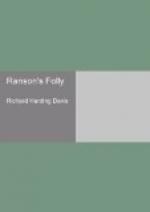“For the next quarter of an hour, as we sat talking, we could hear the cab-whistle sounding, violently, from the doorstep, but apparently with no result.
“‘It cannot be that the cabmen are on strike,’ my friend said, as he rose and walked to the window.
“He pulled back the curtains and at once called to me.
“‘You have never seen a London fog, have you?’ he asked. ’Well, come here. This is one of the best, or, rather, one of the worst, of them.’ I joined him at the window, but I could see nothing. Had I not known that the house looked out upon the street I would have believed that I was facing a dead wall. I raised the sash and stretched out my head, but still I could see nothing. Even the light of the street-lamps, opposite, and in the upper windows of the barracks, had been smothered in the yellow mist. The lights of the room in which I stood penetrated the fog only to the distance of a few inches from my eyes.
“Below me the servant was still sounding his whistle, but I could afford to wait no longer, and told my friend that I would try and find the way to my hotel on foot. He objected, but the letters I had to write were for the Navy Department, and, besides, I had always heard that to be out in a London fog was the most wonderful experience, and I was curious to investigate one for myself.
“My friend went with me to his front door, and laid down a course for me to follow. I was first to walk straight across the street to the brick wall of the Knightsbridge Barracks. I was then to feel my way along the wall until I came to a row of houses set back from the sidewalk. They would bring me to a cross street. On the other side of this street was a row of shops which I was to follow until they joined the iron railings of Hyde Park. I was to keep to the railings until I reached the gates at Hyde Park Corner, where I was to lay a diagonal course across Piccadilly, and tack in toward the railings of Green Park. At the end of these railings, going east, I would find the Walsingham, and my own hotel.
“To a sailor the course did not seem difficult, so I bade my friend good-night and walked forward until my feet touched the paving. I continued upon it until I reached the curbing of the sidewalk. A few steps further, and my hands struck the wall of the barracks. I turned in the direction from which I had just come, and saw a square of faint light cut in the yellow fog. I shouted, ‘All right,’ and the voice of my friend answered, ‘Good luck to you.’ The light from his open door disappeared with a bang, and I was left alone in a dripping, yellow darkness. I have been in the Navy for ten years, but I have never known such a fog as that of last night, not even among the icebergs of Behring Sea. There one at least could see the light of the binnacle, but last night I could not even distinguish the hand by which I guided myself along the barrack-wall. At sea a fog is a natural phenomenon. It is as




